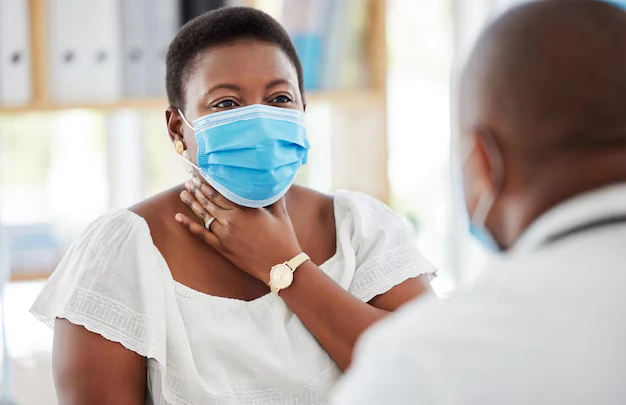Author's details
- Hakim A Abubakre
- BA (Hons) International Business Management.
Reviewer's details
- Dr. Khashau Eleburuike
- MBBS (Ilorin) MSc. Global Health Karolinska Institute
- Resident doctor in family medicine in Northen Sweden.

- Date Published: 2025-03-12
- Date Updated: 2026-01-02
Sore Throat Patient information in sub-Saharan Africa
Key Messages
- Most sore throats are mild, caused by viruses, and resolve on their own within a week.
- Seek medical attention if you have trouble breathing, difficulty swallowing, high fever, or a sore throat lasting more than one week.
- Home care includes drinking fluids, gargling with salt water, eating vitamin C-rich fruits, and resting.
- Avoid smoke, manage allergies, and practice good hygiene to help prevent sore throats.
- Sore throats can sometimes signal serious conditions like bacterial infections, HIV, or tumors, though this is rare
What is a Sore Throat?
A sore throat is a common problem that most people experience at some point. It usually feels painful or scratchy, making it hard to talk, eat, or swallow. The good news is that most sore throats go away on their own within a week, even without any medicine. In some cases, however, you might need to see a doctor if it gets worse.
The most common causes of a sore throat are:
- Viruses: These include the common cold, flu, or even COVID-19.
- Bacteria: Some sore throats are caused by bacterial infections.
- Other causes: Dry air, smoke from cooking with firewood or charcoal, allergies, or stomach acid coming up into the throat can also cause a sore throat.
While many sore throats are not dangerous, sometimes they can be a sign of a more serious problem. A sore throat can make it hard to breathe or swallow, which needs immediate medical attention. Rarely, it can be a symptom of a throat infection, or even a more severe illness like HIV, or a tumor in the throat.
A sore throat can have different symptoms depending on the cause, but the most common ones include:
- A scratchy or painful feeling in your throat
- Pain that worsens when you swallow or talk
- Trouble swallowing
- Swollen or tender glands in your neck or under your jaw
- Red, swollen tonsils
- Hoarse or muffled voice
- Cough, runny nose, or sneezing
- Fever
If you have a sore throat, here are some ways to feel better and speed up recovery:
- Gargle with warm salty water (only for older children and adults)
- Drink plenty of water or fluids in soup
- Eat fruits rich in vitamin C like oranges or tangerines
- Avoid smoking or smoky areas
- Suck on ice cubes, popsicles, or hard sweets (avoid giving small hard items to young children to prevent choking)
- Rest and give your body time to heal
See a doctor or get emergency care if you have any of the following:
- Trouble breathing or difficulty swallowing
- A sore throat that lasts more than one week
- High fever (above 39.4°C/103°F)
- Pus or white spots at the back of your throat
- Blood in your spit or phlegm
- A rash or signs of dehydration (dry mouth, no tears, less urination)
The following are some tips to help prevent getting a sore throat:
- Avoid smoking or smoke exposure: Smoke from cigarettes or cooking fires can irritate your throat.
- Control allergies: If you have allergies to dust, pollen, or pets, try to avoid triggers and manage symptoms to reduce throat irritation.
- Avoid chemicals: Smoke from firewood, sawdust, and other chemicals can irritate the throat. Wearing a mask can help reduce exposure.
- Manage sinus infections: Sinus drainage can irritate your throat. Rinsing your nose with saltwater can help reduce this.
- Stay clean in crowded places: If you live or work in a crowded environment (such as schools, markets, or dormitories), be mindful of the risk of spreading infections. Wash your hands regularly and avoid contact with sick people.
- Good hygiene: Wash your hands often and avoid sharing cups, plates, or towels with someone who has a sore throat.
- Boost your immune system: Eating healthy foods, getting enough sleep, and reducing stress can strengthen your immune system and help prevent infections.
By following these simple steps, you can reduce your chances of getting a sore throat or passing it to others.
- https://www.medicalnewstoday.com/articles/311449#when-to-see-a-doctor
- https://www.nhs.uk/conditions/sore-throat/
- https://www.mayoclinic.org/symptom-checker/sore-throat-in-adults-adult/related-factors/itt-20009075
- https://www.enthealth.org/be_ent_smart/seven-tips-to-help-you-prevent-a-sore-throat/
